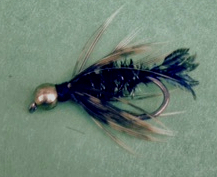 One of the most eloquent books about life, love and understanding is called A River Runs Through It. Written in 1976 it starts, “In our family, there was no clear line between religion and fly-fishing…” and takes you on a journey through the natural beauty that is the Black River in Montana where fly-fishing is art and healing.
One of the most eloquent books about life, love and understanding is called A River Runs Through It. Written in 1976 it starts, “In our family, there was no clear line between religion and fly-fishing…” and takes you on a journey through the natural beauty that is the Black River in Montana where fly-fishing is art and healing.
“Poets talk about “spots of time,” but it is really fishermen who experience eternity compressed into a moment. No one can tell what a spot of time is until suddenly the whole world is a fish and the fish is gone.”~A River Runs Through It by Norman Maclean
The first known female author is Dame Juliana Berners, a prioress for the Sopwell Nunnery near St.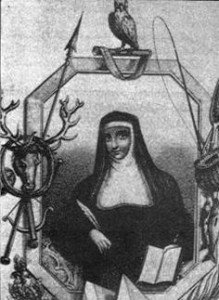 Albans, England. In 1496 she wrote a book called A Treatyse of Fysshynge wyth an Angle. It is a comprehensive book on all aspects of fly-fishing, from creating the right flies to catching fish and using the proper materials to construct the rod and line. Her book is the earliest volume on fishing.
Albans, England. In 1496 she wrote a book called A Treatyse of Fysshynge wyth an Angle. It is a comprehensive book on all aspects of fly-fishing, from creating the right flies to catching fish and using the proper materials to construct the rod and line. Her book is the earliest volume on fishing.
Although separated by hundreds of years, each of these two perspectives on fly-fishing is autobiographical and illustrates the intricacies and complexities of this sport.
Although women have been fly-fishing for hundreds of years, angling isn’t something we necessarily see as a women’s sport. Dame Juliana would be proud to learn that fly-fishing is being used to enhance the quality of life for women with breast cancer. In 1996 Dr. Benita Walton, a plastic surgeon who did reconstruction after breast cancer surgery and a professional fly-fisher, Gwenn Perkins, came together with the idea of Casting For Recovery.
As a surgeon, Benita knew the importance of movement, especially movement of the soft tissue of the shoulder and arm, to promote healing. As a professional fly-fisher, Gwenn knew the healing power of nature. Together their idea has gained enormous momentum. From humble beginnings in Manchester, Vermont, this nonprofit offers 42 support and educational program retreats every year in 35 states.
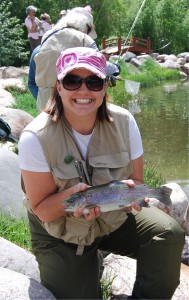 Nearly 600 women go on these fly-fishing retreats each year. Most of the women, 70%, have never gone to a support group before taking the retreat. The organization gets significantly more applications for the retreats than retreat opportunities they can provide.
Nearly 600 women go on these fly-fishing retreats each year. Most of the women, 70%, have never gone to a support group before taking the retreat. The organization gets significantly more applications for the retreats than retreat opportunities they can provide.
Participants pay nothing for the retreat. It is all funded through donations– both monetary and in-kind. Over 1600 volunteers run the retreats including medical personnel, psychosocial professionals and, of course, fly-fishing instructors.
Whitney Milhoan is the current executive director of Casting for Recovery (CfR). Born and raised in Montana, Whitney comes by fly-fishing honestly. She put herself through college as a fly-fishing guide. Her connection to CfR began as a volunteer fly-fishing instructor. After six years working as director of an organization providing adventure programs for young cancer survivors, she learned of the opportunity at CfR and jumped at it.
When I looked, I knew I might never again see so much of the earth so beautiful, the beautiful being something you know added to something you see, in a whole that is different from the sum of its parts. ~A River Runs Through It by Norman Maclean
Mary Jane Edwards, an Wyoming retreat alum says of Casting for Recovery, “Being independent, taking care of others first…I…withdrew into…silence about my diagnosis. CfR 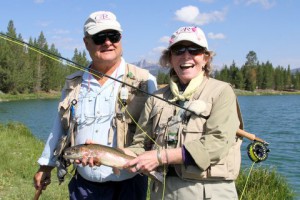 helped me turn the corner…with my diagnosis…I was surrounded by the warmth…care and love of the staff and volunteers for a most extraordinary weekend.”
helped me turn the corner…with my diagnosis…I was surrounded by the warmth…care and love of the staff and volunteers for a most extraordinary weekend.”
Whitney puts it this way. “When 70% of participants say they’ve never gone to a support group, you know you are filling a need.” The women who attend are all stages of breast cancer. They are from all walks of life and range in age from 24 to 90.
In survey after survey, 100% of alums have felt the retreat was a worthwhile experience and 99% would recommend the program to others. The 2 and 1/2 day retreats with 13 other women who have been diagnosed with breast cancer are about learning something new. In the cool waters, up to their hips in waders, holding a light rod and casting a line with a lure in a way that makes it look like a fly settling down on the water, all to attract a fish that they will catch and release…there is diversion. The focus isn’t cancer…it really is fly-fishing.
“I sat there and forgot and forgot, until what remained was the river that went by and I who watched… Eventually the watcher joined the river, and there was only one of us. I believe it was the river.” ~A River Runs Through It by Norman Maclean

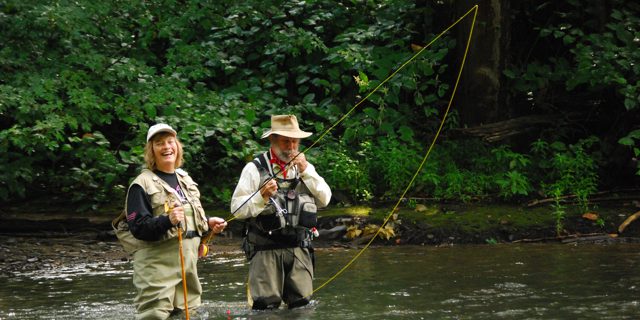





I am grateful for what you are doing and interested in coming to your retreat . I am fighting triple negative breast cancer .. has been great stress on my husband and I for the last 3 1/2 years .. Thank you so very much
Hi Karen,
In order for you to be a part of the retreat, you need to follow the links to the website in this blogpost. There you will find all the information you need to apply for the retreat. I hope that you follow through and go on the retreat. Best wishes, Kathleen
I am very interested and your wonderful retreat. I also have been battling Triple Negative Breast Cancer and it has taken it’s toll on me, my husband and our family. Please let me know what I need to do to apply. thank you so much. Pam
Please follow the links on the post to connect with this retreat. I hope that you are able to enjoy it. Best, Kathleen
Not all women’s cancer is pink! I have stage 4 ovarian cancer with widespread metastatic disease and I can’t even try to go on a fly fishing trip because my cancer took all my reproductive organs but left my breasts? This should be open to women with cancer, period. How sad you discriminate against the rest of us.
I am a 46 yr old with stage 4 metastic breast cancer was already found in ovaries I am currently on a chemo pill I would love this trip with husband and children please let me know how I sign up thank you